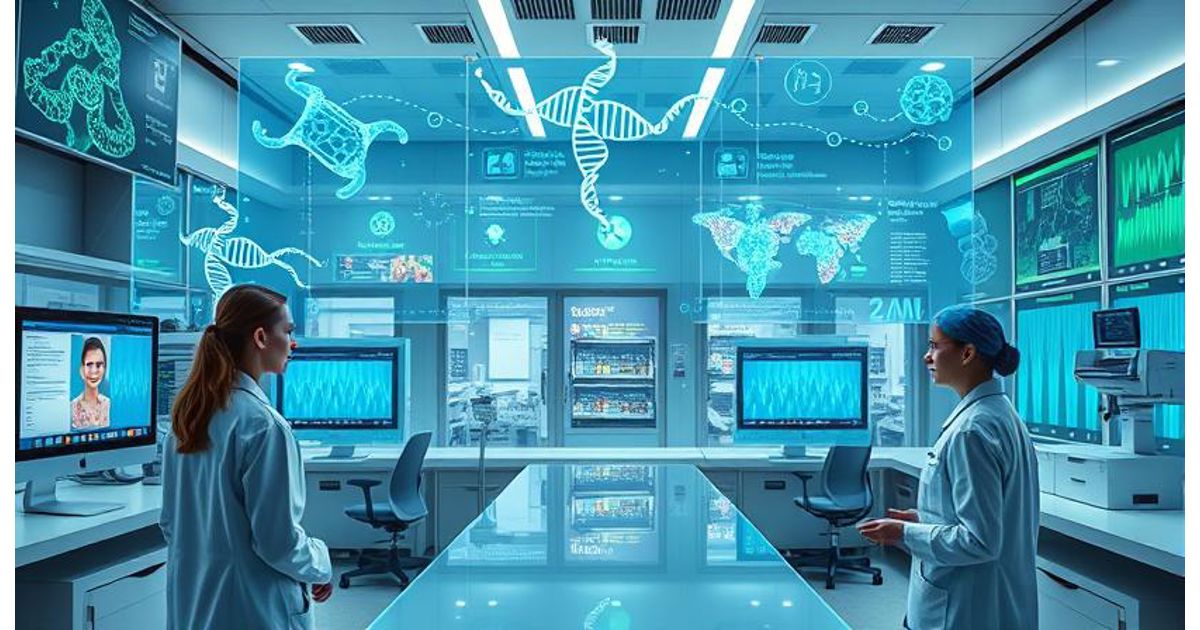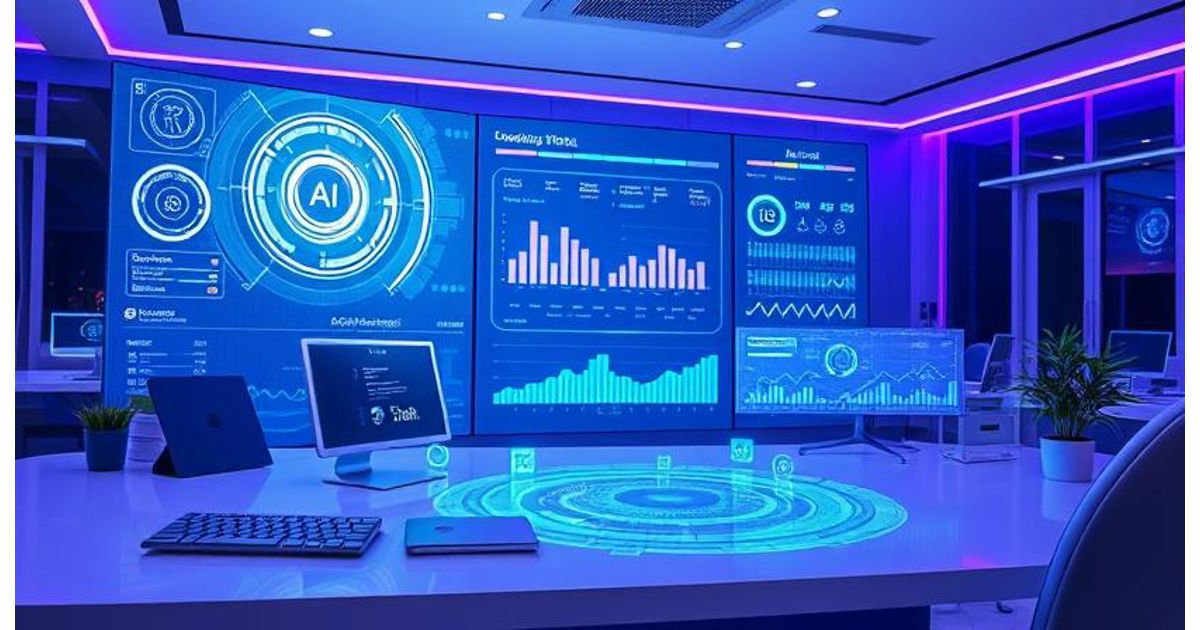AI isn't just a cool idea anymore; it's changing how we do healthcare and biotech. In 2025, AI systems are helping doctors diagnose diseases sooner, speeding up the creation of new drugs, making hospitals run smoother, and creating custom treatment plans in ways we couldn't even imagine five years ago.
The combination of machine learning, fast computers, and huge amounts of health info has opened up amazing chances to make patients better and save money. Looking at these uses in the real world shows just how much AI is changing medicine and biotech.
AI Makes Diagnoses Better
Spotting Problems Early with Medical Images
AI programs that look at medical images like CT scans, MRIs, X-rays, and mammograms are now as good as, or even better than, radiologists at finding different kinds of cancer, heart problems, and other diseases. These systems can check images right away and spot tiny things that people might miss, which means doctors can start treatment sooner when it works best.
This makes a big difference: hospitals that use AI for diagnoses are cutting down on the time it takes to diagnose problems by 40-60%, seeing more patients, and finding more cancers early on when they're easier to treat. Radiologists can now spend their time on tricky cases instead of routine checks, which makes the diagnoses better overall.
Looking Closely at Pathology
AI is changing how we look at tissues to diagnose diseases. AI systems can check samples for cancer, germs, and cell issues with amazing accuracy. This gets rid of the differences you see when different people look at the same sample under a microscope.
Big hospitals around the world are starting to use AI to help with pathology, which cuts down on the time it takes to analyze samples while making diagnoses more accurate. AI can also check samples from anywhere with an internet , so experts can help people in areas that don't have enough specialists.
Faster Drug Creation
Finding the Right Molecules
Finding new drugs used to mean checking millions of chemicals to see if they could fight a disease. This took years and cost a lot of money. AI can make this much faster by guessing which molecules are most likely to work as drugs before scientists even make them.
Companies that use AI to find molecules are cutting down the time it takes to find possible drugs from 4-6 years to just 12-18 months. This means new treatments are getting to patients sooner, and it's cheaper to develop drugs for rare diseases that didn't used to be worth the investment.
Better Clinical Trials
It used to take a long time to find the right people for clinical trials. AI systems can now look at tons of patient info to find people who fit the trial requirements. They can also guess who is most likely to get better with the treatment and who is least likely to have bad reactions.
This makes trials faster, improves the results, and makes the trials more likely to be successful. Drug companies that finish trials faster and have better success rates can get new treatments approved faster and save money.
Understanding Proteins
Knowing how proteins are built is key to making drugs that can fight diseases. AI systems can now guess the 3D shape of proteins from their basic building blocks with amazing accuracy.
This helps scientists find ways to target diseases and create new treatments faster. Researchers who used to be stuck because they didn't know the shape of a protein can now go after diseases that seemed impossible to treat before.
Custom Medicine
Using Genes to Guide Treatment
AI systems can look at a person's genes to figure out which treatments are most likely to work for them. Doctors can now give cancer patients treatments that target the specific problems in their tumors instead of giving everyone the same treatment.
This makes treatments work better, cuts down on bad side , and lets doctors change treatments sooner if they aren't working. Checking genes and using AI to guide treatment is becoming normal for cancer and other genetic diseases.
Predicting How People Will React to Drugs
The small differences in people's genes can change how their bodies handle drugs. AI models can learn from lots of gene info and treatment results to guess how a person will react to a drug. This helps doctors pick the right drugs and the right amounts for each person.
This approach stops bad drug , cuts down on the need to try different drugs to find the right one, and helps people stick with their treatment because they feel better sooner. Insurance companies are starting to pay for gene tests because it saves money in the long run.
Better Hospitals
Using Resources Wisely
AI systems can look at hospital data to figure out the best way to schedule staff, maintain equipment, and use beds based on how many patients are coming in. Emergency rooms that use AI to guide resource use are cutting down on wait times, making staff happier with better schedules, and making patients safer by using resources in the best way.
AI can also guess when equipment is likely to break down, so hospitals can do maintenance before there's a problem. Algorithms can also schedule operating rooms to cut down on delays and make surgeons and nurses more efficient.
Finding Patients at Risk
AI can constantly check patient data to find those who are most likely to have problems. Patients who are flagged as high-risk for being readmitted to the hospital get extra care, help with their medications, and advice on how to live a healthier life so they don't have to go back to the hospital.
This approach makes patients better and saves money by preventing problems instead of dealing with them after they happen. Hospitals that use AI to find patients at risk are cutting down on avoidable readmissions by 15-25% within 18 months.
AI in Action in 2025
Heart Health
AI programs can check EKGs, echocardiograms, and patient records to find people who are at high risk for heart attacks and strokes years before they happen. Treating these people early based on AI guesses prevents millions of deaths each year.
Big heart centers around the world are now using AI to help with risk , and insurance companies are paying for treatments that AI says will help. Devices that monitor heart activity can send data to AI systems that warn doctors about dangerous patterns before patients even feel symptoms.
Mental Health
AI chatbots can give people therapy based on facts, which fills in the gaps in mental health care where there aren't enough therapists. These systems don't replace therapists, but they do help more people get the care they need.
AI can also look at speech, social media, and data from wearable devices to find people who are at risk of suicide. This lets mental health professionals step in and help. By making mental health care more available and spotting problems early, we can cut down on suicide rates.
Rare Diseases
It usually takes years to diagnose rare diseases, with patients going to lots of different doctors. AI systems that have been trained on lots of medical info can spot rare disease patterns from symptoms and test results in just a few hours.
Telemedicine platforms that use AI to diagnose rare diseases can cut down on the time it takes to get a diagnosis, which means patients can start treatment sooner. People with rare diseases who used to have to travel to see specialists can now get an accurate diagnosis locally with the help of AI.
Roadblocks and What's Next
Keeping Data Safe
AI systems need lots of patient data to learn, which raises privacy concerns. Rules like HIPAA and GDPR create complicated requirements that try to balance new ideas with privacy.
New approaches are emerging that let AI models learn from data without collecting sensitive info in one place. There are also techniques that add random noise to data to protect privacy while still letting AI learn from it.
Getting Doctors On Board
Doctors are right to be careful about AI , so we need to run studies that show AI can improve results compared to normal care. Insurance companies won't pay for AI treatments unless they're proven to work.
Organizations that share clear data, publish results in journals, and involve doctors early on are seeing faster and better results with AI than those that don't.
Avoiding Bias
AI systems that are trained mostly on data from rich countries might not work as well on people from other backgrounds. This could make existing health problems worse.
Companies are now making an effort to collect diverse data, check how AI systems work on different groups of people, and fix any problems they find.
The Future
AI has gone from being a promising idea to a real tool in healthcare and biotech. It's making patients better, speeding up drug , and saving money.
The combination of better AI, more health data, clear rules, and proven results means AI will only become more important. Hospitals that embrace AI now will have an edge in patient care, efficiency, and research.
Doctors and patients who understand these uses can make good choices about using AI and push for responsible that puts patients first. The future of medicine depends on combining human skills with AI to get results that neither could achieve alone.


